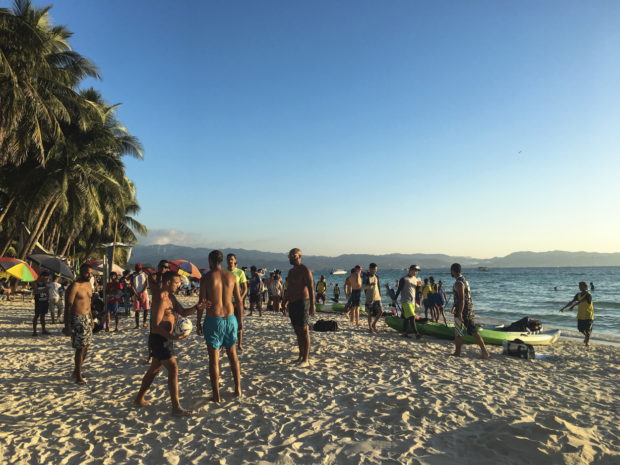
SUNSET IN BORACAY Foreign and local tourists enjoy the sunset in Boracay despite reports of
persistent environmental problems on the country’s top resort island. —SHERWIN VARDELEON
Following President Rodrigo Duterte’s directive to crack down on pollution in Boracay, government agencies are now considering measures to limit the number of new buildings, businesses and even tourists on the world-famous island.
Environment Secretary Roy Cimatu on Wednesday said he “favors a moratorium on the construction of new buildings and the opening of new business establishments, especially in the beach area.”
Cimatu issued the statement after his department issued notices of violation of environmental laws to 51 of some 340 establishments on the island.
Most of the violations involved noncompliance with the Clean Water Act, which mandates establishments to dispose of their septic wastes through a treatment facility.
DENR warning
The crackdown came days after Mr. Duterte called Boracay a “cesspool” and threatened to shut down the island
in six months if the Department of Environment and Natural Resources (DENR) could not solve its sewage and garbage problem.
Cimatu has warned that water services will be discontinued to establishments that do not respond in three to five days to the notices of violation.
Outright closure await those that fail to comply with the
requirements of the Clean Water Act of 2004 in two months, he said.
Cimatu’s spokesperson, Environment Undersecretary Jonas Leones, told the Inquirer that a proposal to limit the number of tourists on the island was also being considered.
Overcrowding
“A major problem is how to control the influx of tourists on the island, which appears to have exceeded its carrying capacity for tourists,” Leones said. “One way to solve overcrowding is to limit the number of tourists.”
Leones cited information from the local government that waste generation on the island tripled over the holiday season of December to January.
Boracay attracts 2 million visitors and generates P56 billion in annual revenues, according to tourism department and industry sources.
Construction activities add to the population “pressure,” as workers bring their families to the island, Leones said.
Visitors from cruise ships have also been adding to the overcrowding.
“That’s the only way to give a chance to Boracay Island to heal itself—[to limit tourists] perhaps for one month or two months,” the undersecretary said.
“No matter how strictly we enforce environmental laws, if the cause is still there, nothing will happen.”
Environmental fee
Leones underscored the importance of participation of the local government unit (LGU), which collects an environmental fee from tourists, in efforts to clean up the island. “We don’t know where [the LGU-collected fee] goes.”
Cimatu also called out the local government in the area to do its part.
“The local government of Malay [in Aklan province] has direct jurisdiction and supervision over Boracay. It is the primary government unit responsible in ensuring that all laws, environmental or otherwise, are executed and followed,” he said.
Malay officials have yet to comment on the issue.
‘Bitter pill’
The Department of Tourism said it supported the crackdown on violators.
“The massive cleanup of Boracay is a bitter pill that we have to swallow if we were to collectively save and sustain Boracay,” said Tourism Secretary Wanda Tulfo-Teo in a statement.
Senators on Wednesday urged the local government of Aklan to strictly enforce all environmental laws and local ordinances to fast-track the rehabilitation of Boracay and save it from permanent closure.
Sen. Nancy Binay, chair of the Senate committee on tourism, proposed the creation of a citizens’ team that would act as an oversight committee to monitor and manage the country’s most popular beach destination.
No immediate closure
There will be no immediate closure of establishments on Boracay Island violating environmental laws and regulations, according to the DENR.
“We have to follow due process and we will give the establishments time to respond,” Jim Sampulna, DENR director for Western Visayas, told the Inquirer on Wednesday.
Notices of violations are also being given to owners of buildings and structures in areas categorized as forest land.
About 1,000 residential and other structures are in timberland areas.
Sampulna met with officials of the province and Malay town and with business operators on Wednesday in Kalibo, Aklan, to discuss the six-month deadline set by Mr. Duterte to address the environmental problems of Boracay.
“We have agreed to work with each other to meet this deadline and we have discussed action plans so we can speed up the enforcement,” he said. —With a report from Jocelyn R. Uy